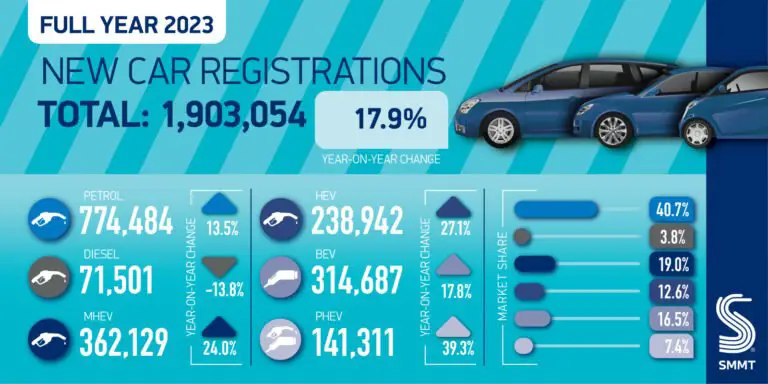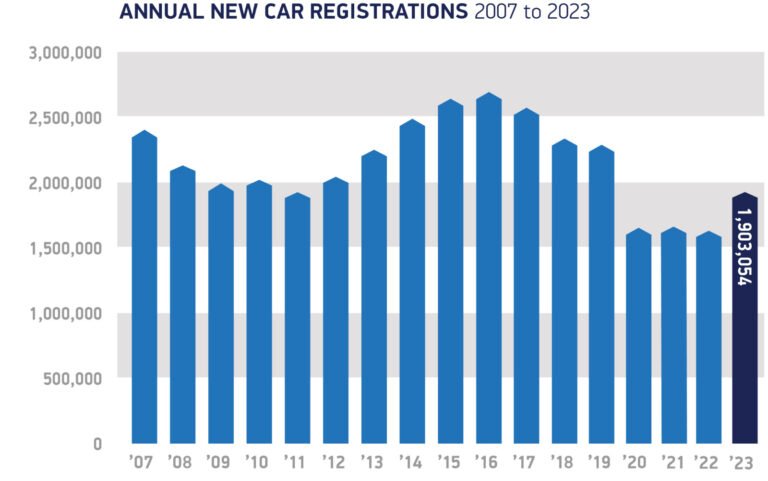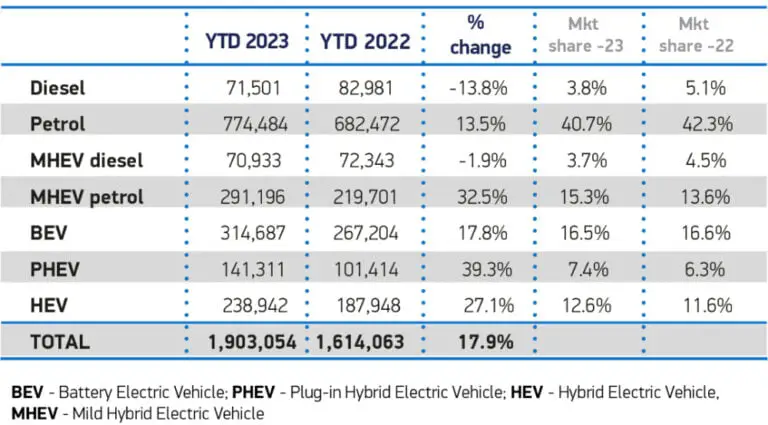In full-year 2023, the new car market in Britain expanded with sales up by 18% to 1.9 million new passenger vehicle registrations in the UK.

2023 (January to December): new passenger vehicle registrations in Britain increased by 17.9% to 1,903,054 cars — the highest level in four years and the first year-on-year market expansion since 2016. Private demand for new cars in the UK was slightly weaker. Petrol remained the preferred fuel for new cars and although battery-electric car sales increased by 17.8%, the share of electric cars in the British new car market in 2023 slipped to 16.5%.
In 2023, the new car market in Britain expanded by 17.9% to 1,903,054 newly registered passenger vehicles. Volkswagen was the top-selling brand in the UK. The Ford Puma was the favorite car model of the British in 2023 and the Tesla Model Y was the best-selling battery-electric car in the UK.
Latest British Car Sales Data: 2024: Market Overview, Brands, Models, Electric; 2023-2008.
New Car Market in Britain in 2023

New passenger vehicle registrations in Britain increased by 17.9% to 1,903.054 cars in the full year 2023. Car sales in the UK were at the highest level since the pandemic and December 2023 was the 17th month of consecutive growth.
According to the Society of Motor Manufacturers and Traders (SMMT), growth in car sales in Britain in 2023 was driven entirely by fleet investment, as the previous year’s supply constraints faded and helped fulfil pent-up demand. Fleet deliveries rebounded by 38.7% year on year, while business registrations, a small proportion of the market, fell by -1.5%. Private consumer demand remained stable at 817,673 units (-0.1) after a strong recovery in 2022 — cost of living pressures and high-interest rates constrained growth.
While the overall new car market remains -17.7% below pre-pandemic levels, the surge in sales compared with the previous year saw the value of new car sales jump more than £10 billion to around £70 billion, with 288,991 additional vehicles reaching the road, based on an average value of £36,474 per car.
British Car Sales by Year (2006 – 2023)

New car sales in Britain in 2023 were at the highest level in four years but again failed to reach the two-million vehicle mark. Remarkably, 2023 was the first year-on-year growth in car sales in the UK since 2016
Annual new car sales in Britain were as follows since 2007:
| Year | UK Car Sales | % Change |
| 2023 | 1,903,054 | 17.9 |
| 2022 | 1,614,063 | -2 |
| 2021 | 1,647,181 | 1 |
| 2020 | 1,631,064 | -29.4 |
| 2019 | 2,311,140 | -2.4 |
| 2018 | 2,367,147 | -6.8 |
| 2017 | 2,540,617 | -5.65 |
| 2016 | 2,692,786 | 2.25 |
| 2015 | 2,633,503 | 6.3 |
| 2014 | 2,476,435 | 9.4 |
| 2013 | 2,264,737 | 11 |
| 2012 | 2,044,609 | 5.3 |
| 2011 | 1,941,253 | -4.4 |
| 2010 | 2,030,846 | 1.8 |
| 2009 | 1,994,999 | -6.4 |
| 2008 | 2,131,795 | -11 |
| 2007 | 2,404,007 | – |
| 1992 | 1,594,000 | – |
| Source: SMMT |
Car Sales in Britain in 2023 by Fuel Type

Petrol remained by far the most popular fuel source for new cars sold in Britain in 2023 with the market share increasing further if the various hybrid models that run on petrol are added. The share of diesel new passenger cars in the UK slipped to below 4%.
Although battery-electric car sales increased by 17.8% in Britain in 2023, the market share actually slipped slightly to 16.5%.
In 2023, the new car market in Britain expanded by 17.9% to 1,903,054 newly registered passenger vehicles. Volkswagen was the top-selling brand in the UK. The Ford Puma was the favorite car model of the British in 2023 and the Tesla Model Y was the best-selling battery-electric car in the UK.
Latest British Car Sales Data: 2024: Market Overview, Brands, Models, Electric; 2023-2008.
